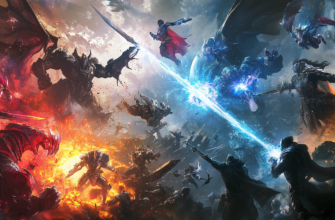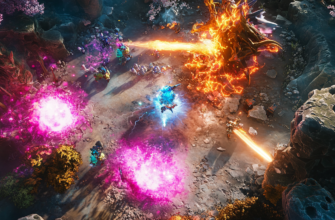- The impact of a strong plot on immersion in RPGs
- What is immersion and why does the plot matter in an RPG?
- Step 1: Building character motivation through plot
- Step 2: World-building through plot-driven immersion
- Step 3: Emotional investment – making the stakes matter
- Conclusion: why the plot is king in RPG immersion
The impact of a strong plot on immersion in RPGs
When it comes to role-playing games (RPGs), most gamers – myself included – seek more than just exciting combat systems or flashy graphics. Sure, I love a well-designed battle as much as the next guy, but let’s be real: what truly hooks us, keeps us glued to the screen for hours, and makes those late-night gaming sessions fly by is immersion. And at the core of that immersion? A well-crafted plot.
The essence of an RPG is its ability to transport players into another world, where they can take on different identities, make meaningful decisions, and become a part of a story that feels uniquely theirs. In this guide, I’m going to walk you through why the plot is critical for immersion in RPGs, sharing some personal experiences, tips for spotting great storytelling, and what RPGs truly nail plot-driven immersion. Ready to dive in? Buckle up, bro, let’s get into it!
What is immersion and why does the plot matter in an RPG?
First off, let’s break down what we mean by immersion. Think of it as the feeling of being ‘lost’ in a game, where you forget that you’re just sitting at your desk or on your couch. Everything around you fades away, and you’re fully absorbed in the game’s universe. For RPGs, achieving this sense of immersion hinges on several factors – the plot being a huge one.
Sure, game mechanics, character development, and exploration are important, but if the storyline isn’t engaging or doesn’t feel personal or impactful, all those other elements fall flat. Think about the last RPG you played with a weak story: even if the combat was fantastic, how long did that game hold your attention? If you’re like me, not very long.
A strong plot draws you in, makes you care about the world you’re exploring, the characters you’re encountering, and the quests you’re embarking on. When done right, it transforms an RPG from a series of repetitive actions into a living, breathing experience where every choice feels like it shapes the outcome.
Step 1: Building character motivation through plot
One of the plot’s first jobs is to give you, the player, a reason to care. No matter how customizable the protagonist is or how open-ended the world may be, if the plot doesn’t answer the ‘why’ then you’re just wandering aimlessly.
Take iconic RPGs like The Witcher 3 or Mass Effect. Both these games give your character clear goals from the beginning – whether it’s searching for your missing ward or leading a fight against intergalactic destruction – but as you progress, the story deepens. Your decisions further define your character, and their motivations shift based on how you shape the story. This dynamic is what drives immersion.
Here’s how the plot should engage you through your character:
- Establish a clear purpose: Early on, the game’s narrative should give you a reason for playing. Whether it’s a quest for vengeance, saving a kingdom, or finding ancient treasure, you need motivation.
- Evolve over time: As you progress, the story should grow, offering more complex stakes, intertwining character arcs, and making you rethink your goals.
- Make it personal: The plot should make your character’s journey feel like it’s your own by posing moral dilemmas, forcing tough decisions, and allowing consequences that impact the world around you.
Without these key elements, it feels like you’re just ticking off tasks on a to-do list rather than driving an adventure forward.
Step 2: World-building through plot-driven immersion
A gripping RPG narrative not only pulls you into your character’s journey but also makes the game’s world feel alive. This idea is known as world-building, and boy, let me tell you – a rich, well-constructed world can make all the difference! Plot-driven world-building ties the elements of the ecosystem, politics, history, and lore directly into your experience, making the world around you feel real.
For example, think of games like Skyrim or Dragon Age: Inquisition. Start focusing on a seemingly minor detail the NPCs talk about, and before you know it, you’re sucked into a quest that deepens your understanding of the realm or its cultures. What the game does so well is give meaning to all elements within the world, allowing you to uncover lore that feels integral to your immersion in the story’s universe.
Here are tricks for spotting RPGs with world-building that boosts immersion:
- Organic lore delivery: Rather than forcing information dumps through dialogues, a great story allows players to discover the lore naturally, whether through exploration, combat, or conversations with NPCs.
- Interconnected side quests: Side stories shouldn’t feel like distractions. Instead, a good plot weaves them into the greater narrative, rewardfully expanding the universe.
- Environmental storytelling: Details in the environment – ruins, objects, landscapes – reveal pieces of the plot. When an environment tells a story, you don’t feel like you’re just playing a static level; it feels as if the world is a living character, enriched through the plot.
Step 3: Emotional investment – making the stakes matter
A powerful RPG plot doesn’t just keep your character busy with tasks; it hauls you into the emotional core of the game. It makes you care about the world’s fate, the internal struggles of your companions, and your own role in it all. RPGs become memorable when you’re emotionally invested in the game.
A good example is Final Fantasy VII, where through the development of characters and unraveling mysteries, you build emotional ties with them. When a key event takes place (you know which moment I’m talking about, FF fans), it’s heart-wrenching because you’ve been immersed in the story and deeply invested in the fates of the characters.
To make the stakes matter in RPGs, here are some plot characteristics to look out for:
- Layered character relationships: Throughout the plot, you should feel relationships build naturally with characters. Great RPGs allow you to influence these bonds through dialogue choices or even combat decisions, making emotions feel real.
- Hard choices with consequences: Plot decisions should always carry weight. Should you save an NPC’s village at the expense of another region? Will your alliances come back to haunt you later in the game? These morally gray areas amp up the intensity and the emotional stakes.
- Betrayals and unexpected twists: Nothing seals emotional attachment to a plot quite like a shocking betrayal or unexpected development. Plot twists that catch you off guard are paramount for keeping your feelings engaged!
Conclusion: why the plot is king in RPG immersion
In the end, if you care about getting sucked into a game – really feeling that your adventure matters – then you need to pay attention to the plot. Whether it’s about understanding the stakes, becoming connected to characters, or experiencing a world that feels uniquely alive, the narrative sits at the heart of immersion for RPGs.
The next time you invest hours into an RPG, take a moment to think: is this plot driving my immersion? A powerful narrative can hold your attention in ways that polished gameplay and cutting-edge graphics alone can’t. So when choosing your next RPG adventure, don’t just seek out massive worlds or endless skill trees; look for stories you can get lost in. Trust me, once the plot pulls you in, there’s no turning back!
If you’re ready to dive into an immersive RPG, check out critically acclaimed titles like Divinity: Original Sin 2, The Witcher 3, and even classic gems like Baldur’s Gate. We all know there’s a new adventure out there, waiting to whisk you away with an unforgettable story. Can’t wait to hear what you think!

















